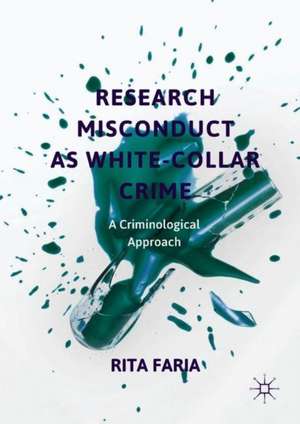Research Misconduct as White-Collar Crime: A Criminological Approach
Autor Rita Fariaen Limba Engleză Hardback – 4 oct 2018
This book explores the subject of research misconduct: its definition, what behaviours should fall under its label, and the types of preventive and repressive procedures that should be put to practice to combat it. Adopting a criminological perspective, Faria views research misconduct as a locus of analysis for corporate and white-collar crime. Based upon an empirical study involving in-depth interviews and documentary analysis, this original research offers an interesting approach to an age-old problem which is growing ever more important.
The commodification of research – together with perceived risks of research misconduct – is opening the way to ambiguous and ineffective forms of social control over scholars, affecting their commitment to research integrity and the responsible conduct of research. Despite this, however, little consensus around the phenomenon exists. Seeking to counter this, Faria opens up the discussion on the potentialsocial harms arising from the current state of affairs, and argues that that criminology should task itself with understanding and researching the pressing topic of research misconduct, including fabrication, falsification, and plagiarism, as well as questionable research practices.
| Toate formatele și edițiile | Preț | Express |
|---|---|---|
| Paperback (1) | 484.30 lei 6-8 săpt. | |
| Springer International Publishing – 24 ian 2019 | 484.30 lei 6-8 săpt. | |
| Hardback (1) | 590.63 lei 6-8 săpt. | |
| Springer International Publishing – 4 oct 2018 | 590.63 lei 6-8 săpt. |
Preț: 590.63 lei
Preț vechi: 694.86 lei
-15% Nou
Puncte Express: 886
Preț estimativ în valută:
113.02€ • 116.77$ • 94.02£
113.02€ • 116.77$ • 94.02£
Carte tipărită la comandă
Livrare economică 19 martie-02 aprilie
Preluare comenzi: 021 569.72.76
Specificații
ISBN-13: 9783319734347
ISBN-10: 3319734342
Pagini: 228
Ilustrații: XIX, 258 p. 4 illus., 2 illus. in color.
Dimensiuni: 148 x 210 mm
Greutate: 0.6 kg
Ediția:1st ed. 2018
Editura: Springer International Publishing
Colecția Palgrave Macmillan
Locul publicării:Cham, Switzerland
ISBN-10: 3319734342
Pagini: 228
Ilustrații: XIX, 258 p. 4 illus., 2 illus. in color.
Dimensiuni: 148 x 210 mm
Greutate: 0.6 kg
Ediția:1st ed. 2018
Editura: Springer International Publishing
Colecția Palgrave Macmillan
Locul publicării:Cham, Switzerland
Cuprins
Chapter 1. Introduction: “I Committed Scientific Fraud, I Changed and Invented Research Data”.-Chapter 2. Why Should Criminology Be Studying Research Misconduct?.- Chapter 3. What is Research Misconduct?.- Chapter 4. “Good Luck with the Research That Will End Your Career”.- Chapter 5. What Do Researchers Know and Perceive about Research Misconduct?.- Chapter 6. Preventing, Regulating, and Punishing Research Misconduct: Myth of Reality?.- Chapter 7. A Criminological Agenda For Studying Research Misconduct
Notă biografică
Rita Faria is Assistant Professor at the School of Criminology, Faculty of Law at the University of Porto, Portugal, and member of the International Research Center on Crime, Justice and Security.
Textul de pe ultima copertă
This book explores the subject of research misconduct: its definition, what behaviours should fall under its label, and the types of preventive and repressive procedures that should be put to practice to combat it. Adopting a criminological perspective, Faria views research misconduct as a locus of analysis for corporate and white-collar crime. Based upon an empirical study involving in-depth interviews and documentary analysis, this original research offers an interesting approach to an age-old problem which is growing ever more important.
The commodification of research – together with perceived risks of research misconduct – is opening the way to ambiguous and ineffective forms of social control over scholars, affecting their commitment to research integrity and the responsible conduct of research. Despite this, however, little consensus around the phenomenon exists. Seeking to counter this, Faria opens up the discussion on the potential social harms arising from the current state of affairs, and argues that that criminology should task itself with understanding and researching the pressing topic of research misconduct, including fabrication, falsification, and plagiarism, as well as questionable research practices.
Caracteristici
Explores research misconduct within the context of Europe Argues why Criminology should be studying research misconduct Draws on empirical data: interviews and European social control and public policy documents
